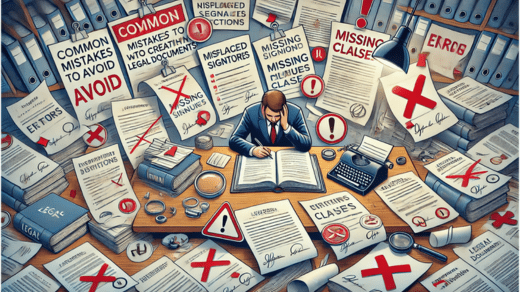Creating legal documents can be a daunting task, especially for individuals or businesses unfamiliar with legal jargon or procedures. Whether drafting a will, business contract, or any other legally binding document, it’s essential to ensure accuracy and clarity. Even minor mistakes can lead to misunderstandings, legal disputes, or unintended consequences. Here are some common mistakes to avoid when creating legal documents and tips on how to sidestep them.
1. Lack of Clarity in Language
One of the most significant mistakes when drafting legal documents is using vague or ambiguous language. Legal documents must be clear and precise to avoid multiple interpretations. Words like “reasonable,” “soon,” or “may” can lead to confusion. It is crucial to define terms where necessary and be explicit about responsibilities, timeframes, and obligations.
Tip: Use specific and straightforward language. Define all key terms, and avoid using jargon unless it’s legally required. If possible, have someone unfamiliar with the subject read through the document to ensure it is easy to understand.
2. Failure to Consider Legal Requirements
Each legal document must comply with local, state, or national regulations. Failing to meet these legal requirements can invalidate the entire document. For instance, a contract may require certain clauses, a specific format, or notarization. Similarly, if you’re drafting a will, some jurisdictions mandate that it must be signed in the presence of witnesses.
Tip: Research the legal requirements specific to the type of document you’re drafting. Consulting a legal professional can also help ensure that the document meets all necessary legal standards.
3. Ignoring the Importance of Dates and Signatures
Dates and signatures are essential components of most legal documents. Without proper signatures, a legal document may not be enforceable. Furthermore, failure to include dates can cause confusion regarding when certain obligations or agreements should commence or conclude.
Tip: Always ensure that the document includes signature lines for all involved parties and that dates are recorded for important events, such as the effective date of the contract or the signing date of a will.
4. Inadequate Attention to Detail
Misspelled names, incorrect addresses, or misstated terms can severely impact the validity and enforceability of a legal document. Even small details, such as using a wrong middle initial or misstating the amount in a contract, can cause significant issues down the road.
Tip: Double-check every detail before finalizing the document. Verify the spelling of names, the accuracy of addresses, and the correctness of figures. Reviewing the document with a fine-tooth comb ensures that no small mistakes turn into big problems.
5. Not Defining Roles and Responsibilities Clearly
Many legal documents, especially business contracts, involve several parties with specific roles and responsibilities. Failing to clearly outline who is responsible for what can lead to confusion and potential legal disputes.
Tip: Clearly outline each party’s responsibilities, obligations, and expectations. Define who will do what and when, and specify the consequences if any party fails to meet their obligations.
6. Failing to Plan for Future Changes
Legal documents, especially contracts, often span long periods. Life or business circumstances may change during this time, and failing to plan for such changes can leave you vulnerable. For example, a contract without a clause detailing how changes should be handled may lead to complications if any party needs to alter the agreement.
Tip: Include clauses that address potential future changes, such as termination clauses, renewal options, and amendment procedures. This ensures flexibility and reduces the likelihood of disputes as circumstances evolve.
7. Overlooking the Importance of Review
Rushing to complete a legal document without a thorough review is a common mistake. Legal documents are complex, and it’s easy to miss crucial details when drafting or revising. Even minor oversights can have significant legal implications.
Tip: Take your time when reviewing legal documents. If possible, have a legal professional or another party with experience review the document for errors or areas of concern. An extra set of eyes can help catch mistakes you may have missed.
8. Not Accounting for Conflict Resolution
Disputes can arise even when all parties enter an agreement in good faith. Failing to include a clear conflict resolution mechanism in a legal document can lead to prolonged and costly legal battles.
Tip: Include a dispute resolution clause in your legal documents. This can specify how disputes should be resolved, whether through mediation, arbitration, or court proceedings. Having this in place can save time and money if issues arise.
Conclusion
Legal documents are critical tools that safeguard your interests, outline responsibilities, and ensure compliance with legal standards. By avoiding common mistakes like vague language, missing details, and failure to account for legal requirements, you can create robust legal documents that serve their intended purpose. If you’re ever in doubt, consulting a legal professional is always a wise move to ensure your documents are legally sound and error-free.



